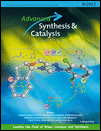
ADVANCED SYNTHESIS & CATALYSIS
Scope & Guideline
Unleashing potential through cutting-edge methodologies.
Introduction
Aims and Scopes
- Catalytic Methodologies:
The journal emphasizes the development of innovative catalytic methodologies, including transition metal catalysis, organocatalysis, and biocatalysis, which facilitate new synthetic routes. - Synthetic Applications:
Research articles often showcase synthetic applications of developed methodologies, demonstrating their utility in the synthesis of complex organic molecules, pharmaceuticals, and materials. - Mechanistic Insights:
The journal encourages studies that provide mechanistic insights into catalytic processes, helping to elucidate reaction pathways and improve catalytic efficiency. - Sustainability in Synthesis:
A growing focus on sustainable practices in organic synthesis is evident, with contributions addressing the use of renewable resources, reduction of waste, and development of green chemistry techniques. - Cross-Coupling Reactions:
Cross-coupling methodologies, especially those involving novel reagents and conditions, are a core area of interest, reflecting ongoing advancements in the field. - Electrochemical and Photochemical Reactions:
Recent publications highlight the increasing importance of electrochemical and photochemical approaches in organic synthesis, showcasing innovative applications and new reaction types.
Trending and Emerging
- Photoredox and Electrochemical Catalysis:
There is a marked increase in studies focused on photoredox and electrochemical catalysis, which highlight the potential of light and electricity to drive organic transformations. - Sustainable and Green Chemistry:
Research emphasizing sustainable methods, including the use of renewable resources and waste reduction practices, is gaining traction, aligning with global sustainability initiatives. - Asymmetric Synthesis:
The journal has seen a rise in contributions dedicated to asymmetric synthesis, particularly using novel chiral catalysts that enhance enantioselectivity in complex molecule construction. - Multicomponent Reactions:
The popularity of multicomponent reactions is on the rise, showcasing their efficiency in synthesizing complex molecules in fewer steps. - Machine Learning and Artificial Intelligence in Catalysis:
Emerging studies integrating machine learning and AI to predict reaction outcomes and optimize catalytic processes are becoming more prevalent, reflecting advancements in computational chemistry. - Diversity-Oriented Synthesis:
Research focused on diversity-oriented synthesis is trending, with an aim to create libraries of compounds with potential biological activity, reflecting the journal's commitment to pharmaceutical applications.
Declining or Waning
- Traditional Organic Synthesis:
There is a noticeable decline in publications focused on traditional organic synthesis methods, as researchers increasingly gravitate toward more modern and efficient catalytic techniques. - Conventional Solvents in Reactions:
Research utilizing conventional solvents is becoming less common, with a shift towards solvent-free or environmentally friendly solvent systems, aligning with the journal's sustainability goals. - Non-Catalytic Reactions:
The frequency of studies on non-catalytic reactions appears to be decreasing, as the journal prioritizes catalytic strategies that offer enhanced efficiency and selectivity. - Inorganic Catalysis:
While still relevant, the focus on inorganic catalysis is diminishing relative to the growing interest in organometallic and organocatalytic methods. - Classical Reaction Mechanisms:
The exploration of classical reaction mechanisms is less prevalent, as contemporary studies favor innovative, complex mechanisms that provide new insights into catalysis.
Similar Journals
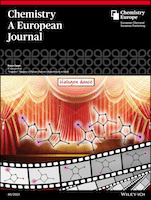
CHEMISTRY-A EUROPEAN JOURNAL
Leading the Charge in European Chemical ScienceCHEMISTRY-A EUROPEAN JOURNAL is a premier academic journal published by WILEY-V C H VERLAG GMBH, specializing in the diverse fields of chemistry and catalysis, with a distinguished focus on organic chemistry. Since its inception in 1995, the journal has established itself as an authoritative resource for researchers and professionals, currently classified in Q1 in Chemistry (miscellaneous) and Organic Chemistry, reflecting its high-quality contributions to the scientific community. With an impressive impact factor and robust Scopus rankings—#33 in Organic Chemistry and #26 in Catalysis—this journal serves as a vital platform for disseminating innovative research findings and critical advancements in chemical sciences. Although not an open-access journal, it provides valuable access options for institutions, ensuring wide reach and engagement within the scientific community. As it converges into 2024, CHEMISTRY-A EUROPEAN JOURNAL remains a key resource for anyone dedicated to advancing the frontiers of chemistry research.
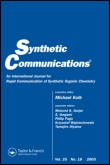
SYNTHETIC COMMUNICATIONS
Connecting Innovators in the World of Organic SynthesisSynthetic Communications, published by Taylor & Francis Inc, stands as a pivotal resource in the field of organic chemistry since its inception in 1971. With an ISSN of 0039-7911 and an E-ISSN of 1532-2432, this journal has established a commendable reputation, holding a Q3 ranking in organic chemistry by 2023, reflecting its contributions to the discipline and positioning it within the 50th percentile according to Scopus rankings. Targeted towards researchers, professionals, and students alike, Synthetic Communications aims to disseminate significant advancements in synthetic methodologies and reactions, facilitating the exchange of innovative ideas and enhancing collaborative efforts in the scientific community. Although not an open-access journal, it offers a wealth of valuable research content that is crucial for anyone dedicated to pushing the boundaries of organic chemistry.

ACS Organic & Inorganic Au
Exploring the Intersection of Organic and Inorganic ChemistryACS Organic & Inorganic Au, published by the American Chemical Society, stands as a premier open-access journal dedicated to advancing the fields of organic and inorganic chemistry. Since its inception in 2021, this journal has swiftly risen to prominence, achieving a commendable Q1 classification in Inorganic Chemistry, Organic Chemistry, and Physical and Theoretical Chemistry as of 2023. With an ISSN of 2694-247X, it provides a vital platform for researchers, professionals, and students to disseminate their findings and engage with cutting-edge work across converged disciplines. Operating from its headquarters in Washington, DC, ACS Organic & Inorganic Au is committed to fostering a collaborative research environment, encouraging rigorous peer review, and ensuring the wide accessibility of high-quality scholarly articles. With its open-access model, readers worldwide can freely access and utilize research findings, promoting a global exchange of knowledge crucial for driving innovation in chemistry.

Chem Catalysis
Exploring groundbreaking discoveries in chemical catalysis.Chem Catalysis is a leading academic journal published by CELL PRESS, specializing in the diverse and dynamic field of chemistry. Since its inception in 2021, this open-access journal has rapidly ascended to prominence, holding Q1 quartile rankings in prestigious categories including Chemistry (Miscellaneous), Organic Chemistry, and Physical and Theoretical Chemistry. With its Scopus rankings placing it in the top tiers—Rank #14 in Organic Chemistry and Rank #12 in Miscellaneous Chemistry—Chem Catalysis serves as a vital platform for disseminating innovative research and catalysis science. Researchers and professionals seeking to stay abreast of cutting-edge developments will find this journal indispensable for advancing their knowledge and contributions to the field. Located in Cambridge, Massachusetts, Chem Catalysis is committed to fostering collaboration and innovation in the chemical sciences, paving the way for breakthroughs that address global challenges.

Green Synthesis and Catalysis
Championing Green Technologies for Global ImpactGreen Synthesis and Catalysis is a pioneering Open Access journal dedicated to advancing the fields of biotechnology and catalysis, published by KEAI PUBLISHING LTD since 2020. With an impressive Q1 ranking in both Biotechnology and Catalysis and notable Scopus rankings placing it in the top echelons of its categories, this journal serves as a critical platform for researchers and professionals dedicated to innovative and sustainable chemical practices. The journal addresses the pressing need for environmentally-friendly synthesis methods and efficient catalytic processes that align with global sustainability goals. Based in Beijing, China, it offers a wealth of peer-reviewed articles, reviews, and cutting-edge research focusing on green technologies and practices. Academics and practitioners alike can benefit from the journal's wide-ranging scope that promises to push the boundaries of current scientific understanding and application. Engage with the latest discoveries by accessing the journal’s enriching content online, and contribute to the transformative dialogue surrounding sustainable synthesis and catalytic innovation.
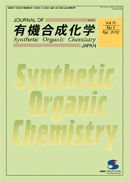
JOURNAL OF SYNTHETIC ORGANIC CHEMISTRY JAPAN
Advancing the frontiers of synthetic organic chemistry.JOURNAL OF SYNTHETIC ORGANIC CHEMISTRY JAPAN, published by the SOCIETY OF SYNTHETIC ORGANIC CHEMISTRY, JAPAN, is an esteemed publication specializing in the dynamic field of organic chemistry. With a rich history dating back to 1944, this journal aims to disseminate pivotal research findings and innovative methodologies in synthetic organic chemistry, fostering collaboration and knowledge exchange among researchers and professionals. Although it currently holds a modest ranking in the Q4 quartile for organic chemistry, its commitment to advancing the discipline remains steadfast. The journal primarily caters to scholars and students seeking to delve deeper into organic synthesis, highlighting original articles, reviews, and methodological studies. While access to the journal is not open, its contributions to the field are essential for anyone invested in understanding the complexities of organic chemistry. We invite you to explore the journal's offerings and enhance your expertise in synthetic organic processes.
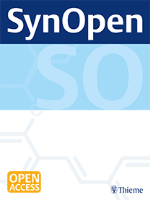
SynOpen
Empowering Open Access for Scientific ProgressSynOpen is an esteemed open-access journal published by GEORG THIEME VERLAG KG, based in Germany, dedicated to advancing the fields of Biomaterials, Catalysis, Materials Science, and Organic Chemistry. Since its inception in 2017, the journal has established itself as a vital platform for researchers wishing to disseminate their findings in a rapidly evolving scientific landscape, earning a commendable Q2 ranking in Materials Science (miscellaneous) and Q3 in other key categories for 2023. With an increasing impact on its disciplines, SynOpen aims to foster interdisciplinary collaboration and innovation by providing unrestricted access to high-quality research, thus promoting a broader reach and visibility for authors. Scholars, professionals, and students alike can benefit from the comprehensive range of topics covered, as the journal's commitment to presenting cutting-edge studies and methodologies positions it as a crucial resource for contemporary scientific inquiry.

CCS Chemistry
Pioneering Discoveries in the World of ChemistryCCS Chemistry, published by the esteemed Chinese Chemical Society, is a leading open-access journal dedicated to advancing the field of chemistry. Since its inception in 2019, the journal has rapidly gained recognition, achieving a remarkable impact factor that places it in the prestigious Q1 category in Chemistry (Miscellaneous) as of 2023. With a Scopus ranking of #41 out of 408 in General Chemistry, CCS Chemistry represents the top 10th percentile in its category, reflecting its commitment to high-quality research and innovation. The journal serves as a vital platform for researchers and professionals to share their findings, showcase cutting-edge methodologies, and engage with the latest developments in various chemistry subfields. Accessible to a global audience, CCS Chemistry ensures that groundbreaking research is available without barriers, making it an indispensable resource for students and academics aiming to stay at the forefront of chemical sciences. For further details, submissions, and access to published articles, please visit the journal's website.

HELVETICA CHIMICA ACTA
Illuminating Innovations in Chemistry Since 1918HELVETICA CHIMICA ACTA, published by WILEY-V C H VERLAG GMBH, stands as a pivotal journal in the fields of chemistry and chemical research. Established in 1918, this esteemed journal spans a diverse array of topics, including biochemistry, catalysis, drug discovery, inorganic and organic chemistry, as well as physical and theoretical chemistry. With influence reflected in its noteworthy Q2 and Q3 quartile rankings across these categories as of 2023, HELVETICA CHIMICA ACTA continues to capture the interest of the global scientific community. Although not an open-access journal, it remains accessible through various academic institutions, ensuring broad reach and collaboration opportunities. Researchers, professionals, and students alike will find its meticulously peer-reviewed articles critical for advancing knowledge and fostering innovation within the chemical sciences. As the journal converges toward 2024, it remains committed to publishing high-quality, impactful research that supports the evolution of chemistry across its multifaceted disciplines.

JOURNAL OF CHEMICAL SCIENCES
Empowering Chemists: Open Access to Scientific ExcellenceThe JOURNAL OF CHEMICAL SCIENCES, published by the Indian Academy of Sciences, is a premier academic journal that serves the global community of chemists and researchers. With an ISSN of 0974-3626 and an E-ISSN of 0973-7103, this journal is pivotal in disseminating high-quality research across diverse areas of chemical sciences. As of 2023, it holds a respectable Q3 ranking in the field of Chemistry (miscellaneous) and ranks #215 out of 408 in General Chemistry according to Scopus, reflecting its commitment to advancing the discipline. Operating in an open-access format, the journal ensures that research findings are readily accessible to a broader audience, fostering collaboration and innovation. Established in 1980 and continuing to evolve, the journal's scope encompasses fundamental and applied chemistry, and aims to bridge gaps between theoretical and practical applications. With a mission to support the scientific community, the JOURNAL OF CHEMICAL SCIENCES is an essential resource for researchers, professionals, and students alike, providing a platform for the exchange of groundbreaking ideas and discoveries.